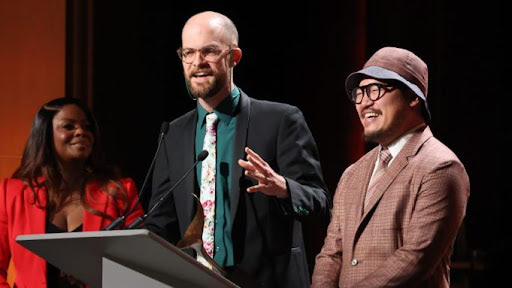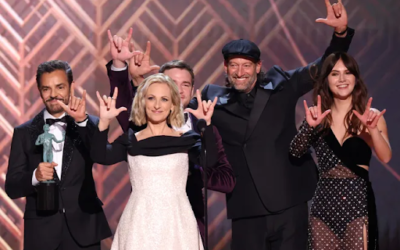Source: Variety
In any other situation, the biggest highlight of any given film awards ceremony would be the films and individuals would be the most talked about topic of the evening. After all, that’s why people attend these sorts of events: to honor the cinematic achievements of the past year and all those involved. In the case of the most recent Writers Guild of America (WGA) Awards, which took place on Friday, March 5th at the Fairmont Century Plaza Hotel in Los Angeles, there seemed to be more on the minds of those present at the ceremony. Granted, there were many cheers to be had in celebration of those who received a given accolade, with there being three film awards handed out by the WGA before the end of the evening, but as the ceremony played out, it became increasingly apparent that the greatest applause was reserved not for the winners themselves, but those calling for the WGA and its various members to come together in anticipation of the upcoming contract negotiations with the major studios, which could signal the possibility of an upcoming strike should talks take a turn for the worse.
Still, one shouldn’t discuss the events of this year’s WGA Awards without discussing those that won, and despite there only being a small handful of film winners, that doesn’t make them any less admirable or noteworthy. The medium of documentary filmmaking, for example, may not seem like the type that would require a written screenplay, but as it turns out, the WGA does in fact hand out an award for Best Documentary Screenplay, this year nominating the following documentary films: “2nd Chance”, “Downfall: The Case Against Boeing”, “Last Flight Home”, “¡Viva Maestro!”, and the eventual winner, “Moonage Daydream”, for which writer Brett Morgan (who also directed, edited, and produced the film) was honored.
In the category for Best Adapted Screenplay, Sarah Polley won for her film “Women Talking”, which she adapted from Miriam Toew’s novel of the same name, coming out on top over fellow nominees “Black Panther: Wakanda Forever”, “Glass Onion: A Knives Out Mystery”, “She Said”, and “Top Gun: Maverick”. In her acceptance speech, Polley gave thanks to a teacher of hers who encouraged her to “let [her] write stories all day”, while also citing the similarities between the themes of her film and the issues that the WGA would be contending with during their upcoming negotiations. This would be one of many references to the forthcoming talks made throughout the evening, with Polley emphasizing the need for collective action. “It’s about having the hard conversations,” Polley stated in her speech, “about envisioning and taking responsibility for having the vision of a better future. That is the definition of a union.”
Similar sentiments were expressed by Daniel Kwan and Daniel Scheinert when they won the award for Best Original Screenplay for their film “Everything Everywhere All at Once”, which had been given to them over “The Fabelmans”, “The Menu”, “Nope” and “Tár”. This is yet another major win for a film that has proven itself to be an unexpected powerhouse over the awards season, and with this being the last major ceremony before the Academy Awards, many have reasonably assumed that the film winning Best Picture and many other Oscars is all but a guarantee. Regardless, Kwan and Scheinert displayed nothing but humility in their acceptance of the award. “Writing is confusing and hard, and we felt so lost so often,” Scheinert claimed. “Thank you to our therapists.” Once Scheinert finished speaking, Kwan openly requested that his fellow writers prepare for the possibility of contract negotiations failing and leading to all productions coming to a halt. “Every single benefit is something that has been hard fought and hard won,” Kwan stated as he encouraged his fellow WGA members to think hard about what can be gained and what could be put at risk from the upcoming talks. “The perverse incentives this industry has been boiling in is going to push against you in every single direction unless we stand together.”
Discussions of contracts and strikes, of course, were not limited merely to acceptance speeches; in fact, this subject was the very first thing brought up once the ceremony got started. “Welcome to the Writers Guild Awards and strike authorization vote,” host and “Abbot Elementary” star Janelle James as the event began, while renowned filmmaker Charlie Kaufman, while receiving a Screenwriting Laurel career achievement award, had more than a couple fiery remarks regarding the power structure in Hollywood. “We are trained to believe that what we do is secondary to what they do,” the “Being John Malkovich” and “Eternal Sunshine of the Spotless Mind” screenwriter stated in allusion to executives whose desperate need to keep their jobs caused them to make harmful decisions. “Our work is to reflect the world, say what is true in the face of so much lying. The rest is window dressing at best, ‘Triumph of the Will’ at worst.”
Few, however, could make the point better than Meredith Stiehm, president of the WGA West, who described the guild as a “good sheriff” who “[walked] around like Gary Cooper — low key but watchful, vigilant and a little swagger.” The WGA, according to Stiehm, is a force determined to preserve peace but still willing to enforce the rules set in place by their contracts by any means necessary. “The guild says there are rules, there are laws,” Stiehm noted while acknowledging a recent lawsuit that resulted in a settlement where over $42 million in residuals were owed to several guild members. “We stand up to people who aren’t playing fair. We’re not looking for a fight. But we’re not going to get rolled, either.”
At the moment, contract negotiations are expected to begin on March 20th, and in the time between now and then, Stiehm encourages her fellow WGA members to remain unified in their efforts to receive a better deal. “It’s possible it could get a little rough, a little rugged,” Stiehm warned. “But we have been there before. We know how to stick together. We’ve done it before. Sticking together is how we win. The point of the union is to stick together…. Solidarity is everything.”




